
Warming up before the party / Missing the eye by a centimeter / Tsaya suffers from myocarditis
N 51°33'336'' E 099°15'341''
Day: 209
Sunrise:
08:32
Sunset:
18:41
Total kilometers:
1281
Soil condition:
Ice, snow
Temperature – Day (maximum):
minus 10°C
Temperature – day (minimum):
minus 28°C
Temperature – Night:
minus 33°C
Latitude:
51°33’336”
Longitude:
099°15’341”
Maximum height:
1981 m above sea level


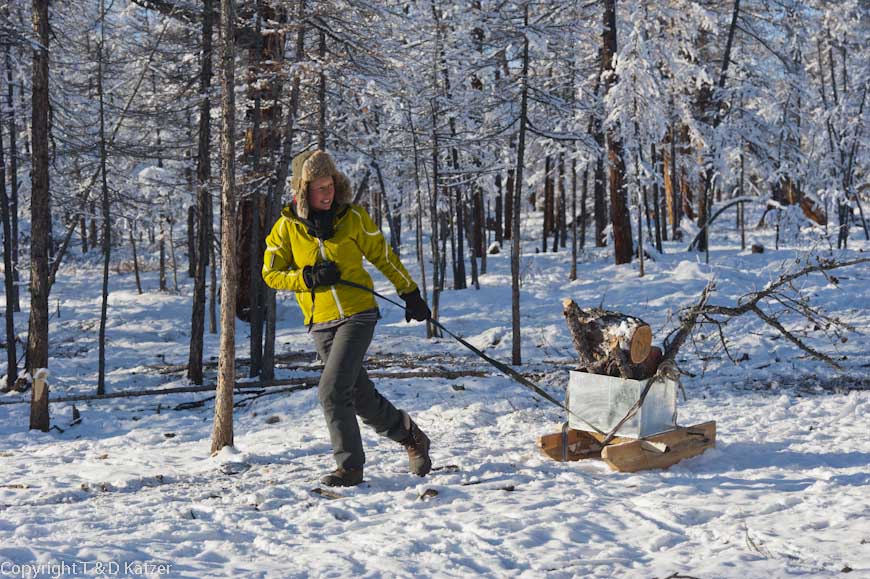
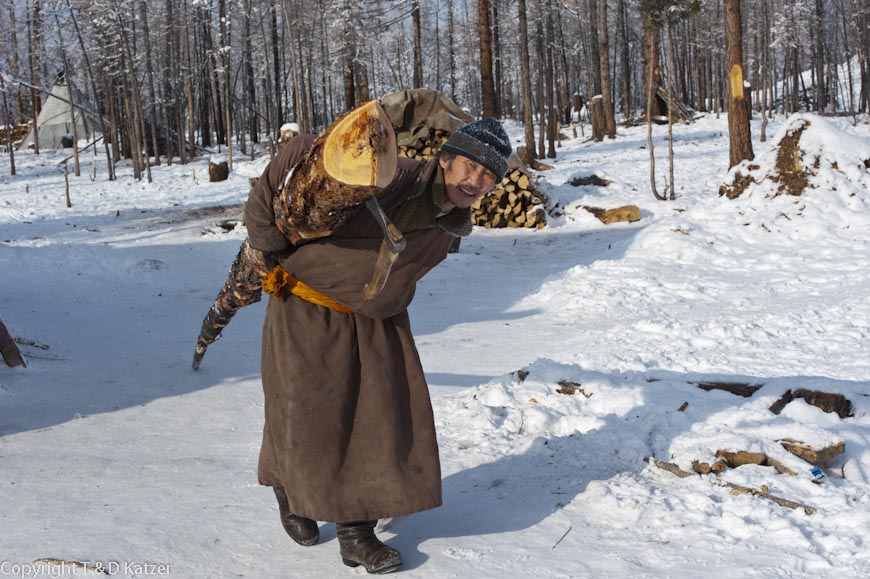
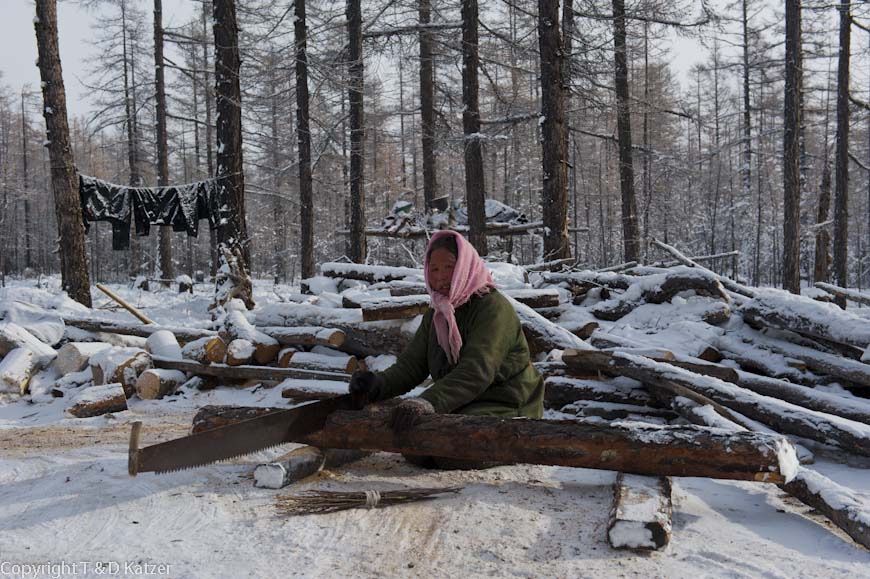
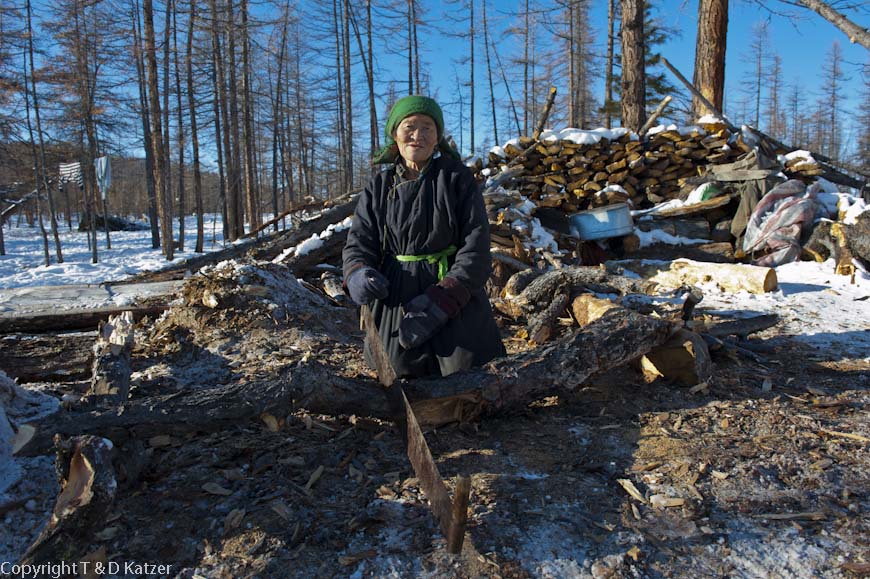
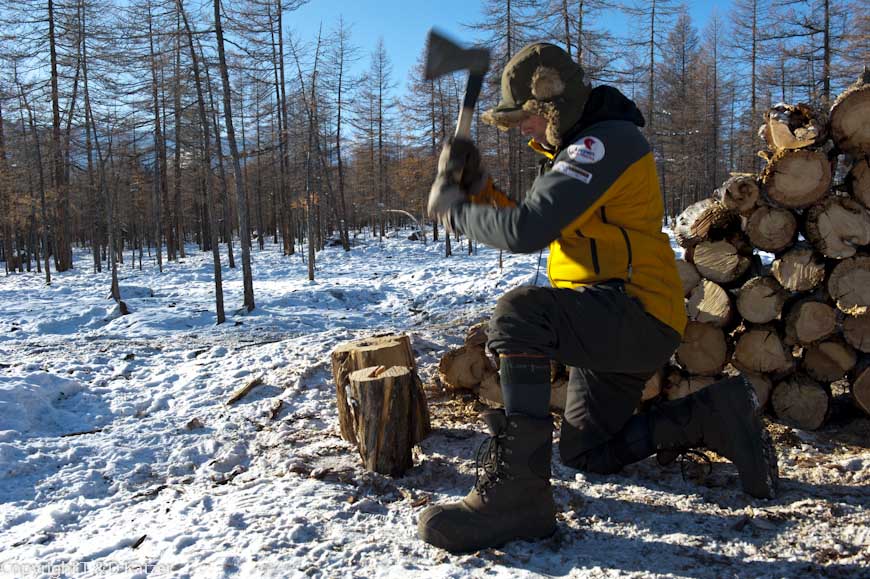
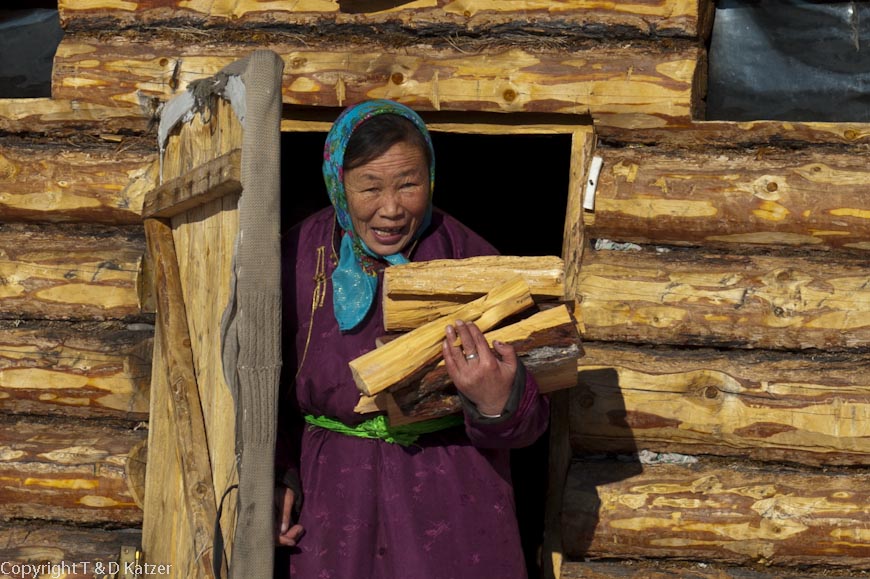
After several days, Tasaya, Ultsan, Tso, Gamba, Purvee and a few others return from their shopping trip to Tsgaan Nuur. The driver announces his arrival with a loud, silence-breaking honk. As soon as the worn tires of the rickety jeep come to a halt in the crunching snow, the doors spring open. Tso tumbles out, heavily battered. He remains lying there for a few moments until he picks himself up and stands there swaying and grinning broadly like a bridge whose pillars are collapsing. The driver also gets out, opens the back door of the vehicle and throws a completely limp body over his shoulders to carry it to log cabin two. “My God. It’s Gamba,” I say quietly to Tanja, who is standing next to me to greet the new arrivals. “He must have drunk a lot of vodka,” she says. “If he’s drunk himself into such a dilirium for sure. Normally he can take a lot of it and drinks everyone under the table. Apparently they started celebrating the upcoming Tsagaan Saar days ago.” “A bit early, don’t you think?” “Hm, I think the slightest reason here is cause for a round or two of vodka. They’re probably just warming up. That way they’ll be in shape for the party.” “Or completely exhausted,” Tanja replies with a grin.
Missed the eye by a centimeter
Because there is no work during the holidays, all the work has to be done in the days before. This is the reason why everyone in the camp chops mountains of firewood. Tanja and I also use the time to go into the forest. Although it’s getting slightly warmer day by day, we have to be very careful not to get frostbite on our fingers, the tip of our noses and ears when working in the forest, especially when my damn chainsaw breaks down. Then I’m forced to take off my gloves to turn the constantly changing dials to get the engine going again. Sometimes my fingers get so cold that they start to hurt terribly. Especially the little finger. I stick my finger in my mouth to avoid rapid frostbite. The pain is amazing when the tissue thaws. When it’s warm, I slip back into my gloves and try to start up the disaster chainsaw again to saw the tree trunks into pieces. After this strenuous work, we drag a primitive sledge loaded with blocks of wood to the base. It’s hard work that requires all our strength. Next to the yurt, I chop the mostly frozen logs into kindling. Angered by a stubborn branch, I let my axe whiz down again and again. Suddenly the end of the branch jumps off and hits my right eyebrow. The force of the impact is so great that it literally snaps my head back. “Ahhhhh!” I scream in pain and grab my eye. Blood. My hands are full of blood. I leave the axe where I threw it and hurry into the yurt. “I’ve hurt myself. But my eye seems to be okay,” I add so as not to scare Tanja unnecessarily as I enter. “Oh dear. That doesn’t look good. What’s happened?”. “A branch jumped on my head. The damn thing granted itself before I could beat it to death,” I try to joke. “Let’s have a look. It’s best if you lie down on the wall,” says Tanja and immediately fetches some bandages. “You were really lucky. Just a centimeter deeper and it could have cost you your eyesight. It’s a really deep laceration. It will leave a scar. But that’s not so bad for men,” she says, disinfecting the wound. “Actually, your eyebrow should be stitched or at least stapled. But we’re not equipped for that.” “On previous expeditions, I always had an anaesthetic for local anaesthesia and sutures with me. We should take that with us again on the next trip,” I reply while Tanja cleans the injury. “Interesting,” I murmur, lost in thought. “What’s interesting?” asks Tanja. “I was just thinking about how dangerous life in the wilderness can be. You always have to have both feet on the ground. Always focused. The slightest mistake can have fatal consequences here. Even if you have to relieve yourself in the bushes, it’s important not to just wander around lost in thought. My night-time exit showed me that a few days ago. And now this stupid branch. Simply ridiculous. And yet it was my own fault. I should have worn glasses. Then the thing wouldn’t have hit my eyebrow or maybe even my eye. I was just lucky.” “Luck is part of it. We humans need it from time to time,” Tanja replies. “True, but if I had been more careful, that wouldn’t have happened. Then I wouldn’t have had to push my luck. I think we humans are responsible for most of the misfortunes that happen to us. But we often need one or two experiences to learn from them. From tomorrow, for example, I will no longer chop wood without my glasses. So that stupid branch has taught me something,’ I muse aloud to myself and think about what a hard life the Tuwa lead in the taiga. For them, the nearest hospital is relatively far away. There is no emergency service, no dentist, no social security or insurance to step in for the affected person in an emergency. Life out here is a balancing act. As long as nothing out of the ordinary happens it may be fine but the smallest thing can change the direction of a life or even destroy it. Of course this also applies to supposed civilization, but in the wilderness the path is very narrow and sometimes rocky.
Tsaya’s hut is a hive of activity. The returnees celebrate. Tso lies on the low bed made of rough wooden beams as if felled by an axe. Sometimes he wakes up from his coma-like sleep to down another glass of vodka, then he falls over again. For Tsaya, these extensive encounters are sometimes a burden. Since their log cabin is built in the center of the community, all residents and visitors usually meet in this wooden house. For them and Ultsan, this means a great deal of work fetching wood, chopping, fetching and melting snow and much more.
Tsaya suffers from myocarditis
In the evening, Tsaya says: “We wanted to return the favor and invite you for a bottle of beer. But the men saw that we had bought beer and forced us to share it with them in a friendly manner.” “That doesn’t matter. You don’t have to show your appreciation for our invitations,” she reassures Tanja. As Tsaya seems a little weak, I ask her how she is. “Oh, I haven’t been feeling very well since I caught a bad cold a month ago. I keep feeling a twinge in my chest. I think it’s my heart. Sometimes I wake up at night with shortness of breath. My resting pulse rate is then 130. I am sure that I am suffering from myocarditis. Do you have an antibiotic for me?” she asks. “Well, that’s really bad news. 130 pulse. That sounds ominous. To be honest, you need to go to hospital. I don’t want to give you an antibiotic under these circumstances. It’s too dangerous. If it’s myocarditis, it needs to be treated by professionals. Your symptoms sound like you could be right. If it’s the flu, it can also spread to the lungs. A friend of mine died from it. He was a well-trained triathlete. He continued to train despite having a cold and, as far as I know, his heart became inflamed. Please do me a favor. Get back to Tsagaan Nuur as quickly as possible and go to the hospital,” I say emphatically. “But our party is just around the corner,” she replies. “You don’t want to ruin your health for a party, do you? That’s out of all proportion.” “That’s right,” she says meekly. “Ultsan is giving me a traditional remedy for the night. If it helps, I can save myself a trip to the hospital.” “What kind of remedy is that?” I ask. “These are the tail hairs of a mouse. You only use the hair that attaches directly to the animal’s anus. They smell pungently of the animal’s sweat. The Chinese buy it by the gram and pay a lot of money for it. I think they use it to make medicine and perfume,’ she explains as Ultsan shows me the tail covered in thick fur. “If you touch the hair with your finger and tap your nose with it, you can’t get rid of the smell for a week. It’s very intense and has healing powers. My grandparents and parents use this medicine,” he explains and lets me smell the tail. “Uaaa, a distinct smell indeed,” I say. “And how do you prepare the medicine?” I ask. “I cut off a few tips of fur and boil them in water. The brew is then drunk. Try it here,” he offers me a cup of the traditional medicine. I carefully sip the brew. “It takes some getting used to,” I say, handing the cup back to him.
We look forward to your comments!

